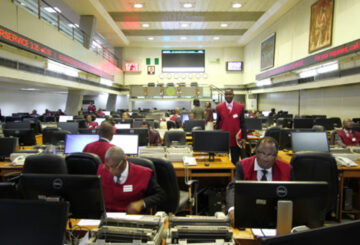
NIGERIAN equities recorded their largest single-day decline in a decade on Tuesday.
The losses were triggered by the tumbling crude oil prices and the confirmation of a second Coronavirus case which continued to fuel major selloffs at the stock market.
The stocks depreciated by N656 billion on Tuesday, bringing the total loss within the past two trading sessions to N985 billion.
All transactions, with the exception of three, on the Nigerian Stock Exchange (NSE) were at discounts, forcing the market to its largest daily decline since March 19, 2010. Average decline stood at 4.9 per cent on Tuesday, equivalent to net capital depreciation of N656 billion.
The aggregate market value of all quoted equities at the NSE dropped from its opening value of N13.366 trillion to close at N12.710 trillion.
The All Share Index (ASI) – the benchmark index for the stock market, declined from its opening index of 25,647.54 points to close at 24,388.66 points. Average year-to-date return worsened to -9.1 per cent.
The ASI had opened Monday at 26,279.61 points while market capitalisation opened at N13.695 trillion.
Several major quoted companies hit their lowest prices in one year yesterday.
They (companies) include: Guaranty Trust Bank (N19.95); Zenith Bank (N13.05); Nigerian Breweries (N33.10); Nestle Nigeria (N1, 017); PZ Cussons Nigeria (N4.05); Stanbic IBTC Holdings (N28.35); GlaxoSmithKline Consumer Nigeria (N3.45); Oando (N2.19); Nigerian Aviation Handling Company (N2.03); Cadbury Nigeria (N6.65) and NASCON Allied Industries, which dropped to a 52-week low of (N11.70) per share.
Analysts agreed that the steep decline was due to the unabated spread of Covid-19 and the crash in crude oil price occasioned by the crude oil output war between Saudi Arabia and Russia.
“As oil prices struggle to trend upwards amid no respite for the COVID-19 outbreak, we expect sentiment to remain bearish in the next trading session,” Afrinvest Securities stated.
Analysts at GTI Securities stated that the continuing decline was due to anxieties over the “impact of the oil price war between Russian and Saudi Arabia on the Nigeria 2020 budget”.
With 33 decliners to three advancers, all sectoral indices also closed negative. The NSE Banking Index declined by 12.5 per cent. The NSE Consumer Goods Index dropped by 4.4 per cent. The NSE Insurance Index dropped by 2.9 per cent. The NSE Industrial Goods Index dipped by 1.1 per cent while the NSE Oil and Gas slipped by 0.9 per cent.
The momentum of activities increased with the selloffs as turnover rose by 220.3 per cent to 594.55 million shares valued at N4.21 billion in 4,010 deals. United Bank for Africa (UBA) was the most active stock with a turnover of 166.42 million shares worth N942.7 million.
The latest bearish cycle worsened the return outlook for investors who had suffered net loss of about N1.35 trillion in February 2020.
The benchmark indices for Nigerian equities closed with average decline of 9.11 per cent for February 2020, equivalent to net capital depreciation of N1.35 trillion. The steep decline in February wiped away net capital gain of N966.7 billion that accrued in January 2020, leaving investors with net capital depreciation of 2.33 per cent or N301.9 billion for the two-month period.
Despite the onset of earnings season, the release of steady corporate earnings and dividends by many corporates and the general undervaluation of Nigerian equities, investors’ appetite has remained low.
Investors in Nigerian equities netted N966.7 billion in January 2020, raising hopes that the market might witness a recovery this year after two consecutive years of negative returns.
The market had recorded negative average full-year return of -14.60 per cent for the 2019 trading year, equivalent to net capital depreciation of N1.71 trillion for the year. It had recorded negative average full-year return of -17.81 per cent in 2018.
The ASI, which doubles as Nigeria’s sovereign equities index, had closed 2018 at 31,430.50 points, down from 38,243.19 points recorded as closing index in 2017. The 2019 pricing performance marked the fifth negative closing in six consecutive years.
The only positive performance in six years was in 2017 when the market recorded a positive return of 42.3 per cent, widely regarded as one of the highest global returns for the year.
Most analysts remained cautious about the short-term outlook for Nigerian equities, after the two-year consecutive decline.
Analysts at United Capital Plc projected that Nigerian equities may deliver a modest average return of some 5.3 per cent in 2020, although the overall market outlook remains susceptible to external shocks and domestic policies.


